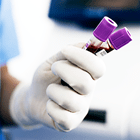Printed from acutecaretesting.org
October 2007
Is venous blood a suitable alternative to arterial blood for blood gas analysis?
Summarized from Malatesha G, Sigh N, Bharija A, Rehani B, Goel A. Comparison of arterial and venous pH, bicarbonate, pCO2 and pO2 in initial emergency department assessment. Emerg Med J 2007; 24: 569-71.
Arterial blood is the standard sample for blood gas analysis but arterial blood sampling is more painful and hazardous to the patient. Such is the relative convenience and safety of sampling venous blood that several studies have sought to investigate the validity of its use as a substitute for arterial blood.
The most recently published of these was conducted at the emergency department of a tertiary-care teaching hospital in Northern India. Over a period of 3 months venous and arterial blood was sampled almost simultaneously (within 2 minutes) from 95 unselected patients whose acute clinical condition on admission warranted arterial blood gas analysis.
Both venous and arterial specimens were submitted for urgent blood gas analysis using an analyzer located in the emergency department. Statistical analysis, using the Bland-Altman method, revealed "excellent" agreement between arterial and venous pH across the pH range of 6.95-7.70 (95 % limits of agreement 0.13 to –0.1), and "acceptable" agreement between arterial and venous pCO2, as well as between arterial and venous bicarbonate.
As expected, there was no agreement between arterial and venous pO2 values. In summary, this study of emergency admission patients suffering a range of pathologies that affect blood gas results has shown, in common with previous studies, that venous blood is an acceptable alternative to arterial blood for measurement of pH, pCO2 and bicarbonate but is unacceptable for pO2 measurement.
May contain information that is not supported by performance and intended use claims of Radiometer's products. See also Legal info.







